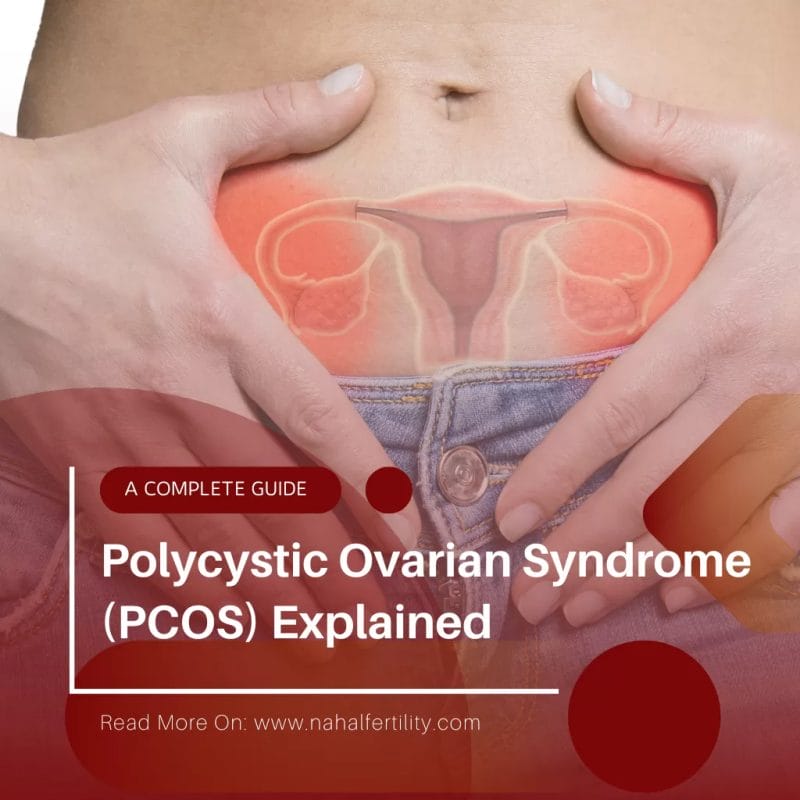Did you know that 1 in 10 women worldwide suffer from Polycystic Ovary Syndrome (PCOS)? Despite being one of the leading causes of infertility, PCOS remains widely misunderstood. This article will provide a deep dive into PCOS—covering its causes, symptoms, diagnosis, and treatment options; while highlighting hope for those affected.
What is Polycystic Ovary Syndrome (PCOS)?
PCOS is a hormonal disorder that affects women of reproductive age, causing irregular menstrual cycles and other symptoms like excessive hair growth and weight gain. The condition disrupts normal ovulation as the dominant follicle fails to form, leaving underdeveloped eggs in the ovaries. These hormonal imbalances often lead to difficulties in conception.
Unlike other conditions, PCOS isn’t limited to reproductive health. It can have wide-ranging effects on metabolic health, increasing the risk of long-term complications. Early recognition and proactive management can significantly improve outcomes.

The Prevalence and Impact of PCOS
Statistics show that PCOS affects up to 10% of women globally. Besides infertility, PCOS is associated with several health risks, including:
- Type II Diabetes: Increased insulin resistance can lead to chronic health issues.
- Cardiovascular Diseases: Higher risks due to obesity and metabolic syndromes.
- Endometrial Cancer: Irregular ovulation may heighten this risk.
Common Symptoms of PCOS
Recognizing PCOS early is key to effective management. Some typical symptoms include:
- Irregular or No Periods: The absence of ovulation disrupts normal menstrual cycles.
- Hirsutism: Excessive hair growth on the face, chest, and back.
- Acne and Oily Skin: Due to elevated androgen levels.
- Weight Gain: Particularly around the abdominal area.
- Thinning Hair: Hair loss or male-pattern baldness.
What Causes PCOS?
Although the exact cause of PCOS remains unknown, research points to several contributing factors:
- Insulin Resistance: Elevated insulin levels can stimulate androgen production, disrupting ovulation.
- Genetics: PCOS often runs in families, suggesting a hereditary component.
- Inflammation: Chronic low-grade inflammation may exacerbate symptoms.
Lifestyle factors, including diet and physical activity, can also influence the severity of PCOS symptoms. For instance, diets high in processed foods may worsen insulin resistance, while physical inactivity contributes to weight gain and hormonal imbalances.
How is PCOS Diagnosed?
Doctors typically diagnose PCOS using the Rotterdam Criteria, which require at least two of the following:
- Irregular Periods: Confirming ovulation dysfunction.
- Elevated Androgen Levels: Evident through physical signs or blood tests.
- Polycystic Ovaries: Observed via ultrasound.
Diagnostic tests may also include blood work to measure hormone levels and screen for related conditions like diabetes or thyroid disorders. An ultrasound scan is often recommended to examine the ovaries for cysts or structural abnormalities.
While these diagnostic methods are effective, they also emphasize the importance of a thorough medical history. Understanding the patient’s symptoms and lifestyle can provide additional context for an accurate diagnosis.

Treatment Options for PCOS
While there’s no cure for PCOS, several interventions can help manage its symptoms and complications:
Lifestyle Changes
Making adjustments to your daily habits can have a profound impact on PCOS symptoms. Weight management is a cornerstone of treatment, as losing even a small percentage of body weight can improve insulin sensitivity and hormonal balance. Choosing a diet rich in whole foods, lean proteins, and healthy fats can help stabilize blood sugar levels.
Exercise plays a dual role, not only aiding weight loss but also improving mood and reducing stress. Activities like yoga and walking are particularly beneficial, as they combine physical movement with mindfulness, addressing both physical and emotional well-being.
Medical Treatments
Medications are often recommended to tackle specific symptoms:
- Birth Control Pills: Regulate menstrual cycles and control androgen levels.
- Metformin: Improves insulin resistance and supports weight loss.
- Clomiphene: Stimulates ovulation, increasing the chances of pregnancy.
For women struggling with infertility, advanced reproductive technologies like in-vitro fertilization (IVF) offer hope. These treatments are tailored to the individual, ensuring the best possible outcomes.
Surgical Options
In some cases, surgery may be considered. Ovarian drilling is a minimally invasive procedure that reduces androgen levels and promotes ovulation. While effective, it is generally reserved for cases where other treatments have been unsuccessful.
Emotional and Psychological Impact of PCOS
The emotional effects of PCOS are often overlooked but can be just as challenging as the physical symptoms. Dealing with infertility, weight gain, and visible symptoms like acne or excessive hair growth can take a toll on mental health.
Seeking support from therapists, support groups, or online communities can provide much-needed emotional relief. Sharing experiences with others who understand the challenges of PCOS can foster a sense of belonging and empowerment.
Frequently Asked Questions (FAQs)
What is the root cause of PCOS?
The root cause of PCOS is unclear but is believed to involve genetics, insulin resistance, and inflammation. Excess insulin stimulates androgen production, disrupting ovulation. While it’s not fully understood, addressing these factors can help manage symptoms effectively.
Is PCOS curable?
PCOS cannot be cured, but it can be managed. Lifestyle changes like a healthy diet and exercise, combined with medical treatments, can reduce symptoms, regulate fertility hormones, and prevent complications like diabetes or heart disease.
What are the symptoms of PCOS?
Common symptoms include irregular periods, excessive hair growth, acne, weight gain, and thinning hair. Symptoms vary and can affect both physical and emotional health. Early diagnosis and treatment improve outcomes significantly.
How can I treat PCOS naturally?
Lifestyle changes are key to managing PCOS. Regular exercise and a low-glycemic diet improve insulin resistance and hormone balance. Stress management through mindfulness or yoga also helps reduce inflammation and support overall health.
Is PCOS dangerous?
PCOS is not directly life-threatening but can lead to complications like diabetes, heart disease, and infertility. Proper management through lifestyle changes and medical care reduces risks and improves quality of life.
Hope for Women with PCOS
PCOS can be overwhelming, but with advancements in medical science and a proactive approach to health, women can lead fulfilling lives. Consult a healthcare provider to discuss personalized management strategies.
Conclusion
Polycystic Ovary Syndrome (PCOS) is more than just a reproductive condition; it’s a lifelong health issue that demands attention and care. If you suspect you may have PCOS, seek professional guidance. Remember, you’re not alone, and effective treatments are within reach.
For more information or to consult with our specialists, visit Nahal Fertility Clinic. Your health matters, and we’re here to support your journey.






